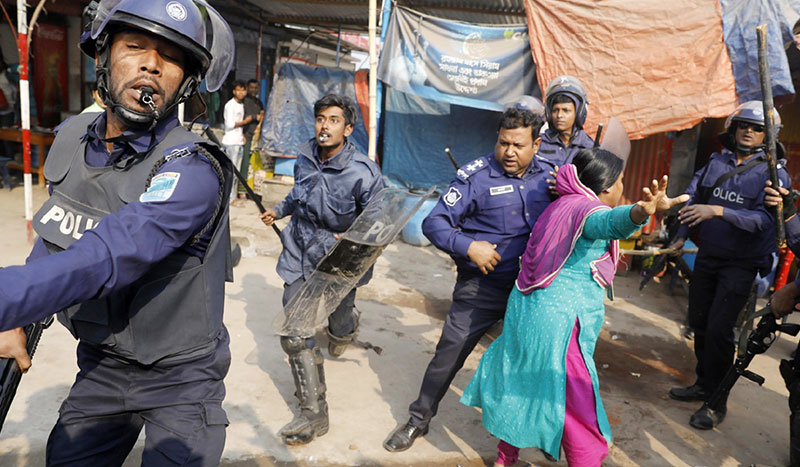Published in blendle.com on Tuesday 15 January 2019
UNDERPAID BANGLADESHI TAILORS REMAIN VICTIMS OF ‘THE SYSTEM’

A week of violent protest by textile workers in Bangladesh is not having an impact. “Why are the big brands not responding now?”
Thousands of textile workers have been dispersed with baton and tear gas during demonstrations in the capital Dhaka. One fell dead last week. Many were injured.
As a punishment, employers threatened to close factories. Bangladesh points to the new minimum wage and asks the workers to resume work. But little has changed. The ‘new’ wage of 8,000 taka (€ 83, ed.) Had already been negotiated in November. Now it is paid out for the first time. Textile workers reject that wage as inhuman and will continue to do so.
According to the Bangladeshi think-tank Center for Policy Dialogue, a worker should receive at least Tk. 10,000.
‘These are emotional, little coordinated protests,’ says political scientist Shantanu Majumder (Dhaka University). ‘It starts with a spark in one factory and before you know it there are two thousand people on the street. We will see this escalate more often. The workers no longer trust anyone. ”
‘Multinationals get a lot of profit from fast fashion from Bangladesh, but the margins for local manufacturers are tight’
According to trade unionist Nazma Aktar, the anger is immense. ‘People do not believe or understand the promises. The lifespan increased by seven percent this year, while wages stagnated. ‘
Forward loans
Tailors in Bangladesh, the second supplier of clothing worldwide, do not receive a living wage. They survive thanks to the labor of family members and usurious loans and alms from the government. “17 percent of the workers we questioned sleep on the floor at their shabby home,” says Dr. Khondaker Moazzem (CPD, Center for Policy Dialogue). The wage rises through supplements for overtime, while the basic wage decreases relatively. That increases the pressure. ‘The government must intervene’, says Moazzem. ‘It is also now that big brands have to make their voices heard, but it remains silent.’ Time is running out: workers no longer have many options.
Option 1: local factories pay fair wages
‘Different manufacturers sit in parliament and stop reforms’, says Majumder. ‘The government has too often chosen their position. Employers also have an influence on the opposition. ‘The manufacturers say that their buyers, the western companies, move away with a higher wage. ‘But cheaper cost countries like Vietnam or Pakistan cannot just deliver the large quantities on time that Bangladesh does,’ says the political scientist. ‘The employers have an attitude problem.’
Option 2: clothing brands offer fair prices
‘Tell your readers that Western brands have to pay more’, says trade unionist Aktar unambiguously. ‘The distribution of margin in the value chain indicates that the margins for local manufacturers are too small,’ says Dr Moazzem. He argues that consumers should pay more and that payment to be passed on to the workers through innovative means, such as better banking facilities.
Option 3: help with government or trade union?
‘The tripartite wage negotiations were poor this year compared to the past’, says Moazzem.
Moreover, the democratic climate in Bangladesh is deteriorating, while external inspection bodies in the sector are being phased out (DS 26 November 2018). ‘Bangladesh is tired of the international finger,’ said a German NGO employee. Workers cannot just set up a trade union. You are still being fired for that. Majumder: ‘Only ten percent of the workers are members of a trade union, and the unions are fragmented. Sometimes they lean towards the government. ‘
Option 4: you argue …
… but until now the answer was repression. This worsens the atmosphere with those who are injured. ’41 percent of the workers have debts. Often this is to pay for a medical emergency, “says CPD. Majumder concludes: ‘It’s not about how an individual prime minister now responds to the unrest, but to the entire system that has to change.’

